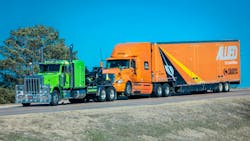As a fleet manager, it’s the phone calls you hate to receive: The ones informing you one of your trucks has broken down or was in a crash.
Fortunately, you trained your truck drivers well. The professional driver phoning in knows that safety comes first. He or she set the truck brakes, turned off the engine, activated the hazard flashers, placed warning flares or triangles, ushered other persons out of the line of oncoming traffic, and even remembered to press the button on the in-cab camera to preserve the video of the event. They called 911 for emergency assistance and highway patrol help. And your driver checked for leaks and spills, as well as entered written notes on the time and circumstances of the breakdown.
In response, you activated your fleet’s “Go-Team”—your safety professional, attorney, and insurance claims adjuster—who assisted your driver in exchanging information with other motorists, noting witnesses, assessing details of the scene, and photographing all involved vehicles and road conditions before the highway patrol and towers moving everything to one side.
Whew! Your driver and your team did everything by the book in a bad situation. Well, maybe not because today you received a huge towing bill. While you and your driver were dealing with the immediacies of an on-road incident, a predatory tower swooped in and assumed control. Now, you are facing monetary charges for multiple ancillary support vehicles and “helpers” brought to the scene, storage, and servicing of your truck by a repair shop you didn’t choose and an outrageous towing rate.
See also: Mississippi passes predatory towing reform
How could you have avoided a predatory tower? As with your response to a breakdown or crash, the key is advance planning and training.
- Make arrangements with a local towing company and its network of affiliated towers. Agree on the terms and conditions, including guaranteed response times and the repair facilities you choose. Your insurance company can assist in identifying reputable towers. Give that information to your drivers and have them verify the identity of any towers that respond to a scene.
- Train your drivers to share the towing company name and how soon it will arrive with the highway patrol. The patrol will defer to the carrier’s choice of a tower and keep others at bay.
- Sometimes, though, the patrol will need to clear the road immediately. Most law enforcement agencies have reputable local towing companies on rotation. Have your drivers note the responding tower, as well as any other support vehicles and personnel. A predatory tower, shunted to one side by the highway patrol, may still try to bill you for its “services.”
- Tell your drivers not to sign any papers. If the towing company was authorized by you, by your insurance company, or by the highway patrol, that is all that’s needed. Extraneous paperwork can mean exorbitant bills.
Remember that your drivers, insurance company, chosen towers, and highway patrol all have your safety interests in mind. Work with them to avoid predatory towers.
About the Author
Steve Vaughn
Senior Vice President of Field Operations
Steve Vaughn is senior vice president of field operations at PrePass Safety Alliance, the provider of PrePass weigh station bypass and electronic toll-payment and management services. Vaughn served nearly three decades with the California Highway Patrol and is a past president of the Commercial Vehicle Safety Alliance.
